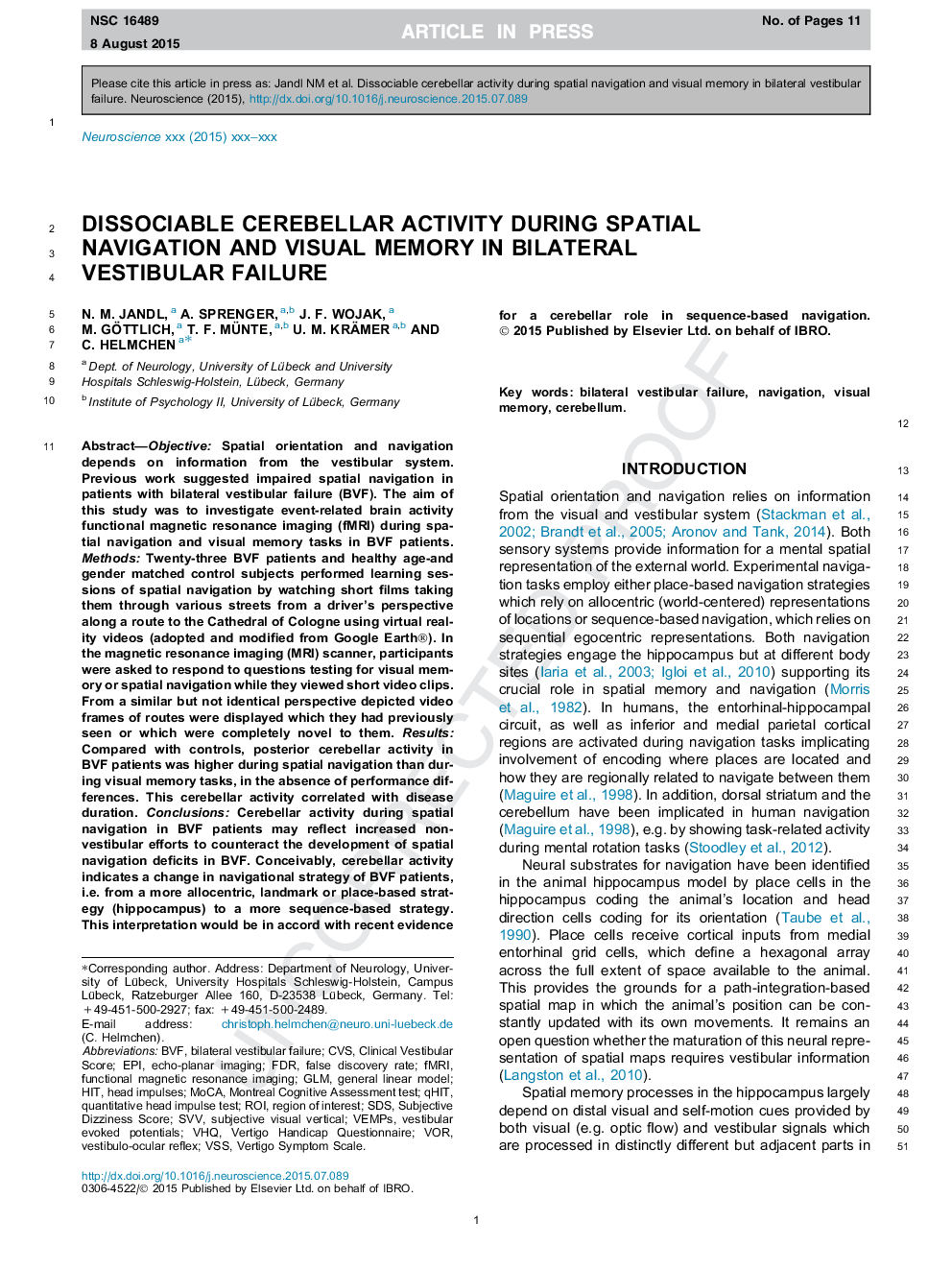| کد مقاله | کد نشریه | سال انتشار | مقاله انگلیسی | نسخه تمام متن |
|---|---|---|---|---|
| 6272236 | 1614771 | 2015 | 11 صفحه PDF | دانلود رایگان |
عنوان انگلیسی مقاله ISI
Dissociable cerebellar activity during spatial navigation and visual memory in bilateral vestibular failure
ترجمه فارسی عنوان
فعالیت مخچه غیر قابل انعطاف در ناوبری فضایی و حافظه بصری در شکستگی دو طرفه وستی بیلی
دانلود مقاله + سفارش ترجمه
دانلود مقاله ISI انگلیسی
رایگان برای ایرانیان
کلمات کلیدی
CVSFDRGLMROIVEMPsBVFSVVEPISDSMoCAVSs - VSShead impulse test - آزمون تست ضربهHIT - اصابتEcho-planar imaging - تصویربرداری اکو فلاریfunctional magnetic resonance imaging - تصویرسازی تشدید مغناطیسی کارکردیfMRI - تصویرسازی تشدید مغناطیسی کارکردیVestibulo-ocular reflex - رفلکس Vestibulo-چشمSubjective visual vertical - عمودی بصری ذهنیVOR - قبل ازGeneral linear model - مدل خطی کلیregion of interest - منطقه مورد نظرfalse discovery rate - میزان کشف کاذبNav - نهvestibular evoked myogenic potentials - ویبولیتین باعث ایجاد پتانسیل مگنی می شودMemo - یادداشت
موضوعات مرتبط
علوم زیستی و بیوفناوری
علم عصب شناسی
علوم اعصاب (عمومی)
چکیده انگلیسی
Objective: Spatial orientation and navigation depends on information from the vestibular system. Previous work suggested impaired spatial navigation in patients with bilateral vestibular failure (BVF). The aim of this study was to investigate event-related brain activity by functional magnetic resonance imaging (fMRI) during spatial navigation and visual memory tasks in BVF patients. Methods: Twenty-three BVF patients and healthy age- and gender matched control subjects performed learning sessions of spatial navigation by watching short films taking them through various streets from a driver's perspective along a route to the Cathedral of Cologne using virtual reality videos (adopted and modified from Google Earth®). In the scanner, participants were asked to respond to questions testing for visual memory or spatial navigation while they viewed short video clips. From a similar but not identical perspective depicted video frames of routes were displayed which they had previously seen or which were completely novel to them. Results: Compared with controls, posterior cerebellar activity in BVF patients was higher during spatial navigation than during visual memory tasks, in the absence of performance differences. This cerebellar activity correlated with disease duration. Conclusions: Cerebellar activity during spatial navigation in BVF patients may reflect increased non-vestibular efforts to counteract the development of spatial navigation deficits in BVF. Conceivably, cerebellar activity indicates a change in navigational strategy of BVF patients, i.e. from a more allocentric, landmark or place-based strategy (hippocampus) to a more sequence-based strategy. This interpretation would be in accord with recent evidence for a cerebellar role in sequence-based navigation.
ناشر
Database: Elsevier - ScienceDirect (ساینس دایرکت)
Journal: Neuroscience - Volume 305, 1 October 2015, Pages 257-267
Journal: Neuroscience - Volume 305, 1 October 2015, Pages 257-267
نویسندگان
N.M. Jandl, A. Sprenger, J.F. Wojak, M. Göttlich, T.F. Münte, U.M. Krämer, C. Helmchen,
